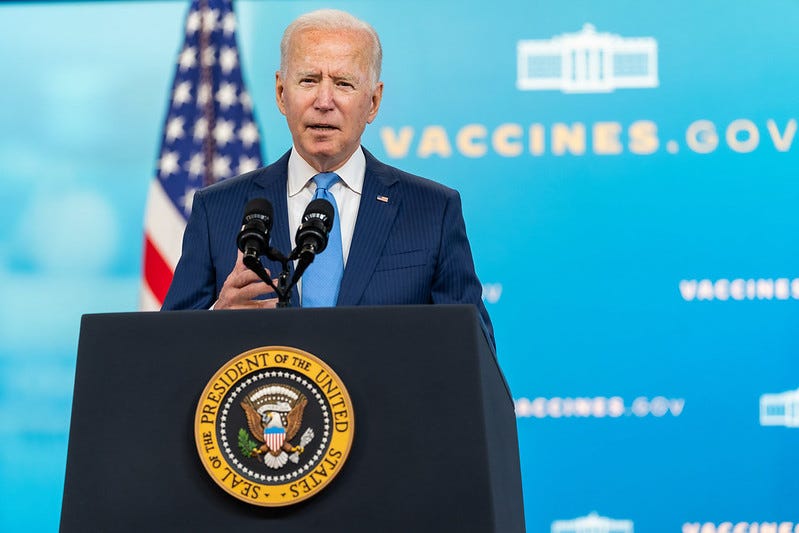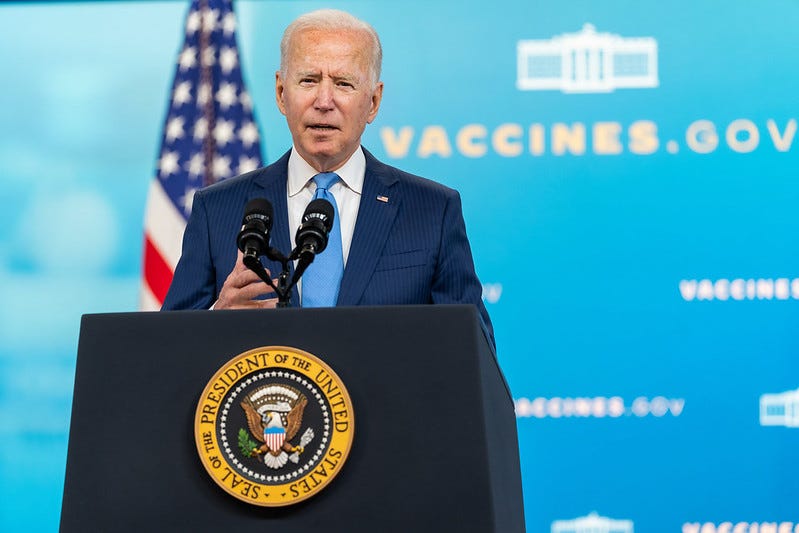Wake Up To Politics - December 2, 2021
Wake Up To Politics: How Biden plans to fight Omicron
by Gabe Fleisher
Good morning! It’s Thursday, December 2, 2021. Election Day 2022 is 341 days away. Election Day 2024 is 1,069 days away.
How Biden plans to fight Omicron
The Omicron variant has arrived in the United States.
Genetic sequencing has confirmed that an individual in California, who recently returned there from South Africa, has contracted the first known COVID-19 case in the U.S. caused by the variant, the CDC announced on Wednesday.
The individual was fully vaccinated, although they had not yet received a booster shot. Like many other cases of the new variant in Europe and Africa, the U.S. patient has had only mild symptoms.
President Biden will address the nation today to share his plan to combat the Omicron variant as winter begins. Here are the key announcements Biden will make:
At-home coronavirus tests will be covered by insurance. Federal agencies will issue guidance next month to ensure that the 150 million Americans with private health insurance will be able to seek reimbursement for rapid, over-the-counter coronavirus testing. At-home coronavirus tests will also be distributed at community health centers and rural clinics to reach those not covered by private insurance. Such tests have been slow to roll out in the U.S. because of their expensive price and low supply.
International travelers will be required to test negative for COVID-19 within a day of departure. Until now, unvaccinated travelers from abroad were required to show negative coronavirus tests from one day before departure, but vaccinated travelers were able to show tests from up to 72 hours before leaving. Now travelers will have to show negative tests from the last 24 hours regardless of vaccination status. Already, any foreign national who travels to the U.S. are required to be fully vaccinated, although U.S. citizens can travel from abroad unvaccinated.
Masking requirements for domestic travel will be extended through March 18. Currently, travelers are federally mandated to wear masks when on buses, trains, and airplanes. The rules were set to expire on January 18, but will now be extended for two more months.
New public education campaigns will be launched to encourage adults to get their booster shots. New paid advertising from the Department of Health and Human Services and a campaign in partnership with the AARP will urge all adults, and especially seniors, in the U.S. to get boosters; currently, only 23% of those eligible have received booster shots. The government will also take steps to make booster shots more available at local pharmacies and will urge (but not require) business to give their employees paid time off to get boosted.
Hundreds of family vaccination clinics will be opened to encourage parents and children to get vaccinated. The new clinics will offer vaccinations for the whole family: parents, teens, and kids, as well as boosters for the adults. In another step to encourage parents to vaccinate their kids, Medicaid will reimburse participating health care providers for offering “COVID-19 vaccine counseling visits” to allow parents to ask questions about vaccinating their children.
“We are pulling out all the stops to get people the maximum amount of protection as we head into winter months,” a senior administration officials told reporters on a conference call Wednesday.
Earlier this week, Biden described the Omicron variant as a “cause for concern, not a cause for panic,” a message he is likely to reiterate today.
What else you should know
→ The future of Roe. A majority of Supreme Court justices seemed prepared during oral arguments on Wednesday to uphold a Mississippi law banning all abortions after 15 weeks of pregnancy, setting up the possibility of a dramatic break from the abortion protections established in Roe v. Wade, the 1973 landmark case.
→ Running, not running. Democrat Stacy Abrams announced that she was waging a second campaign for the Georgia governorship, setting up a rematch with Republican Gov. Brian Kemp. If she wins, she would be the first Black female governor in U.S. history.
Rep. Peter DeFazio, an Oregon Democrat who chairs the House’s transportation committee, announced plans to retire after serving in Congress for 36 years. He is the latest senior Democrat to step down, a sign of low confidence in the party’s ability to maintain their House majority next year.
Gov. Charlie Baker, a Massachusetts Republican who has been one of his party’s most outspoken critics of former President Donald Trump, announced he won’t seek a third term in 2022. Trump had endorsed a primary challenger against him; without Baker in the race, Democrats will likely be able to pick up the state’s governorship.
→ Inside the VP’s office. Symone Sanders, Vice President Kamala Harris’ senior adviser and chief spokesperson, will leave the White House by the end of the year. Sanders is the second high-profile Harris aide to announce plans to step down, following the vice president’s communications director. The departures come after a slew of news stories describing dysfunction within Harris’ office and tension between the VP’s aides and the Biden team.

Ask Gabe
I want to take a moment to answer a few questions I’ve received recently, all related to the legislative process. I’ll take the first two together:
Q: Your daily lists of bills in Congress suggest that the House of Representatives passes a lot, and the Senate rarely passes anything. What happens to the bills the House passes? Do they basically go nowhere? — Robert M.
Q: Frequently, you report that the House of Representatives will vote on legislation under “suspension of the rules.” What exactly does that mean? — Jack J.
A: These questions are related, but I’ll start with the first one. The House and Senate actually pass about the same number of bills: so far this session, the House has passed 442 pieces of legislation and the Senate has passed 379.
So why are there always more bills listed for the House in each day’s “Daybook”? That has to do with the second question. The House uses a process called “suspension of the rules” that essentially fast-tracks uncontroversial pieces of legislation, allowing them to speed through the chamber’s rules — as long as they receive support from two-thirds of House members.
Although the Senate’s rules are generally a bit more cumbersome (see: the filibuster), there is a procedure for bills to be fast-tracked in the upper chamber too, although it requires unanimous consent, not just two-thirds. However, the Senate doesn’t announce in advance which measures it will approve by unanimous consent, which is why the House votes are in “Daybook” but the Senate ones aren’t.
One thing to note, though: because the bar is higher in the Senate, most of the measures passed in the chamber (65% of what has passed this session) are resolutions, often ceremonial statements recognizing certain holidays or celebrating certain groups. In the House, 75% of what’s been passed have been bills, not resolutions, meaning they serve more of a legislative purpose (so “Daybook” does capture the more substantive measures being passed).
So what happens to those House-passed bills? 24% have passed in the Senate and become law. Most of the rest languish in the Senate, blocked by the filibuster or a lack of political will. Some do end up becoming law by being added to larger packages that encompass smaller bills, such as the Build Back Better Act or National Defense Authorization Act that are currently working their ways through Congress.

And here’s the final question:
Q: Reading the list of bills the House will be considering makes me wonder if there is any rhyme or reason for the bill numbers? — Mike C.
A: Bills are numbered in the order they’re introduced in, with the count starting over at the beginning of each two-year session. The only exceptions are that the first 10 slots (H.R. 1 to H.R. 10) are reserved for the majority party to use for the pieces of legislation they designate as their top priorities, and the next 10 slots (H.R. 11 to H.R. 20) are reserved for the minority party to do the same.
That’s how bills like the For the People Act, the Democratic election reform package, and the John R. Lewis Voting Rights Advancement Act end up with coveted designations like H.R. 1 and H.R. 4, respectively.
In case anyone is curious: the House is up to H.R. 6098 this session, and the Senate is up to S. 3288.
Daybook
All times Eastern.
→ President Joe Biden will receive his daily intelligence briefing at 10 a.m. He will then visit the National Institutes of Health (NIH) in Bethesda, Maryland, and deliver remarks at 1:40 p.m. on his plan to combat COVID-19 and the Omicron variant during the winter months.
At 5:30 p.m., the president and First Lady Jill Biden will attend the National Christmas Tree Lighting outside the White House.
→ Vice President Kamala Harris will travel to Charlotte, North Carolina. At 11:20 a.m., Harris and Transportation Secretary Pete Buttigieg will tour a public transit facility in Charlotte. At 11:55 a.m., Harris and Buttigieg will deliver remarks promoting the bipartisan infrastructure law. The joint visit comes amid speculation about the two potentially facing each other in a 2024 or 2028 Democratic presidential primary.
After returning to Washington, Harris and Second Gentleman Doug Emhoff will join the Bidens for the National Christmas Tree Lighting.
→ White House Press Secretary Jen Psaki will hold her daily press briefing at 11 a.m.
→ The Senate will convene at 10 a.m. and resume consideration of H.R. 4350, the National Defense Authorization Act. No votes are scheduled on the defense policy bill, although some could be held if a deal on amendments is struck.
At 12 p.m., the Senate will vote on the confirmation of Brian Nelson to be Under Secretary of the Treasury for Terrorism and Financial Crimes.
→ The House will convene at 8 a.m. Democratic leaders are hoping the chamber will vote today on a continuing resolution (CR) to extend government funding, which is currently slated to expire at midnight on Friday, although a CR has yet to be finalized as negotiations drag on between the two parties.
The chamber may also vote on 15 pieces of legislation under “suspension of the rules”:
H.R. 2355, the Opioid Prescription Verification Act
H.R. 2364, the Synthetic Opioid Danger Awareness Act
H.R. 3743, the Supporting the Foundation for the National Institutes of Health and the Reagan-Udall Foundation for the Food and Drug Administration Act
H.R. 3894, the CARING for Social Determinants Act
H.R. 2930, the Safeguard Tribal Objects of Patrimony Act
H.R. 89, the Agua Caliente Land Exchange Fee to Trust Confirmation Act
H.R. 2074, the Indian Buffalo Management Act
H.R. 3531, the Women Who Worked on the Home Front World War II Memorial Act
H.R. 4706, the Blackwell School National Historic Site Act
H.R. 5677, to make technical amendments to update statutory references to certain provisions classified to title 2, United States Code, title 50, United States Code, and title 52, United States Code
H.R. 5679, to make technical amendments to update statutory references to certain provisions classified to title 7, title 20, and title 43, United States Code
H.R. 5695, to make technical amendments to update statutory references to certain provisions which were formerly classified to chapters 14 and 19 of title 25, United States Code
H.R. 5705, to make technical amendments to update statutory references to provisions reclassified to title 34, United States Code
H.R. 5961, to make revisions in title 5, United States Code, as necessary to keep the title current, and to make technical amendments to improve the United States Code
H.R. 5982, to make revisions in title 51, United States Code, as necessary to keep the title current, and to make technical amendments to improve the United States Code
→ The Supreme Court will not meet today.




